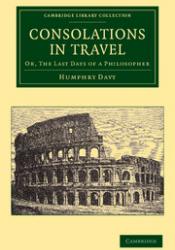"Last Days of a Philosopher" Published
In 1830, Consolations In Travel; Or, The Last Days of a Philosopher was published posthumously from the collection of Sir Humphry Davy after complications from a stroke lead to his death at the age of 50 in 1829. With this work being described as a "somewhat freeform compendium of poetry" and "thoughts on science and philosophy," Davy's final publication was incredibly popular despite his preceding death-- with his multi-genre book becoming a staple of the scientific community as well as family libraries for several decades after his death ("Humphry Davy"). Referred to by Anne Bronte with the shortened title "Last Days of a Philosopher," Davy's work is directly referenced in Chapter 15 of The Tenant of Wildfell Hall in a scene where Gilbert Markham comes across a copy of the book in Helen's possession with the name "Frederick Lawrence" inscribed on the front leaf (Bronte). Anne Bronte's reference to Sir Humphry Davy's final work by both name and author helps not only to solidify the cultural significance of Sir Humphry Davy in the 19th Century, but it also helps ground The Tenant of Wildfell Hall in reality, by providing a real-world text to be alluded to by the characters in Bronte's novel. Although "Last Days of a Philosopher" is well known for its' controversial approach to answering "the questions of the universe" through science, Sir Humphry Davy's reputation seems to outlive his published works-- as he is considered by Cambridge to arguably be the "first celebrity scientist... whose popularising of science made him famous" (Cambridge).
Works Cited
Bronte, Anne. The Tenant of Wildfell Hall. 1848. The COVE. https://studio.covecollective.org/anthologies/frankenstein-or-the-modern.... Accessed 29 Nov 2020.
"Humphry Davy." Wikipedia, Wikimedia Foundation. 26 Nov 2020, https://en.wikipedia.org/wiki/Humphry_Davy. Accessed 29 Nov 2020.
Davy, Humphry. "Consolations in Travel Or, The Last Days of a Philosopher." Cambridge University Press, Cambridge University Press 2020, 6 May 2013, https://www.cambridge.org/us/academic/subjects/general-science/history-s.... Accessed 29 Nov 2020.

